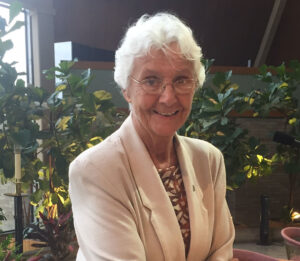
Readings:
Joshua 5:9a, 10-12
Psalm 34:2-3, 4-5, 6-7.
2 Corinthians 5:17-21
Luke 15:1-3, 11-32
Rejoice!
It may seem strange that in the middle of Lent we are told to rejoice. The reason for this is not that we might have a breather from the rigors of penance. (How many of us are really even experiencing any rigors?) Rather, this moment of rejoicing fittingly follows the fundamental theme found in the readings for the other Sundays of this season, that theme being – the goodness of God. The versicle for the responsorial psalm might be used as a response to each of the three readings: “Taste and see the goodness of the LORD.”
In the first reading, we are reminded of how God cared for the Israelites while they were in the wilderness. They had accused God of bringing them out of Egypt so that they might die of hunger in the wilderness. And how did God respond? With punishment? No! The reading tells us that God fed them with mysterious bread that they called ‘manna.’ The people of Joshua’s time had at last arrived in the land of promise. They had been delivered from the reproach of Egypt, and they were now enjoying the produce of the land. They celebrated Passover in memory of God’s graciousness to their ancestors and to them. Their celebration was a way of rejoicing.
Paul tells the Corinthian converts that they are a new creation, made so through the blood of Christ. It was the unbounded love of God that was manifested in Christ. In a similar manner, it was the unbounded love of Christ, symbolized by the shedding of his blood, that had reconciled them with God and made them righteous. This is certainly reason to rejoice. In this reading, they do not offer sacrifice, as did the Israelites of Joshua’s time. Instead, the Corinthians are directed to act as agents of reconciliation throughout the entire world. In this way, they shared in God’s plan of salvation.
The gospel reading is one of the best-known and most striking examples of divine graciousness. Though traditionally known as the parable of the prodigal son, it describes the prodigality of the father. He is the one who seems to go to extremes in showering gifts on his repentant son. The theme of reconciliation, so prominent in the passage from Paul, is certainly evident here. It is the father, who in this parable represents God, who takes steps to be reconciled not only with the wayward son but also with the elder son who was dependable but unforgiving. As the loving father insists: “We must celebrate and rejoice.”
In the responsorial psalm we see the psalmist’s profound gratitude to God, and we hear the way this gratitude is expressed in rejoicing and praise. Having been delivered from fear, the psalmist both praises God and urges others to turn to God so that they too might be delivered and then praise God. Thus, the psalmist is acting as an agent of reconciliation.
As the author of 2 Timothy tells us: “All scripture is inspired by God and is useful for teaching, for refutation, for correction, and for training in righteousness” (2 Tim 3:16). What lessons might we learn from today’s readings? The first and most important lesson to be learned is that of gratitude. There is so much for which each one of us should be grateful. Like the Israelites of old, we have been blessed with freedom and self-determination, the prosperity of the good earth, the love of family and friends. There is so much besides this, so much more that each one in her or his heart cannot even begin to recount God’s graciousness.
Like the Corinthians, we have been made a new creation; we have been given a second chance, in fact, many second chances; we have been called by God to continue God’s own work of reconciliation. In some ways, this is a very difficult blessing to appreciate. Freedom and food are tangible and we can easily be grateful for them. But few of us really grasp the notion of being a new creation with the responsibility of changing our way of living. The real reason for this may be that we are generally quite satisfied with our approach to life. Furthermore, we normally leave the task of reconciliation to religious or political negotiators. The challenge of this teaching may not yet have touched our minds and hearts.
Like the wayward son who never lost his father’s love, we have never really lost God’s love; we have been forgiven. We have experienced God’s forgiveness whenever our friends or family members or coworkers have forgiven us our selfishness or impatience. We do understand this kind of reconciliation, and we are usually grateful for it. Sometimes we even celebrate it.
This Sunday is set aside for us to recall God’s graciousness and to rejoice because of it. In many ways we have been dead, but through God’s grace we have come to life again; we have been lost, but have now been found. We have every reason to rejoice.
Dianne Bergant, CSA













.jpg)

.jpg)
